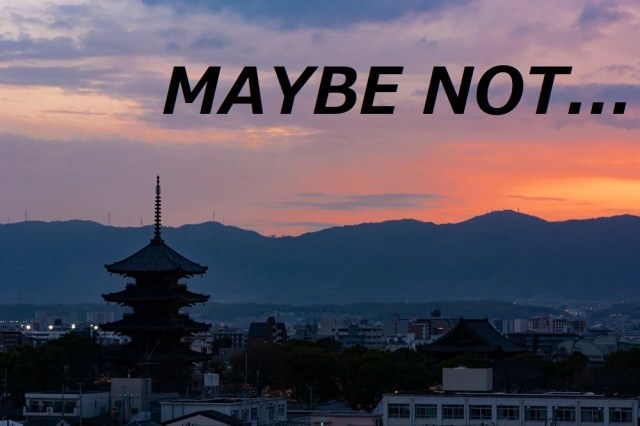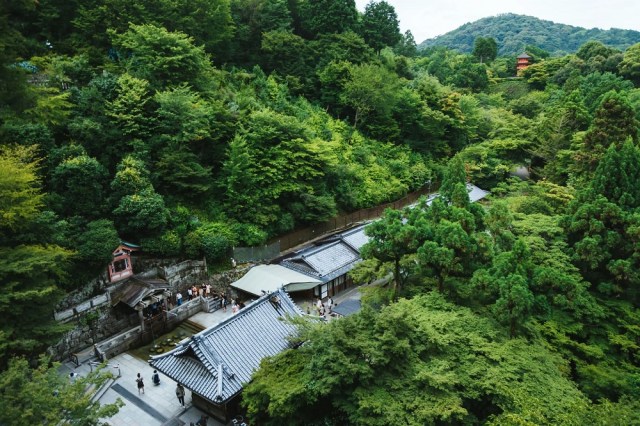
Report says schools are looking at alternatives to the traditional top school trip destination.
When asked why he’d stopped dining at a restaurant he used to frequent, Yogi Berra famously answered “Nobody goes there anymore. It’s too crowded.” It’s one of many famous quotes from the Hall of Fame baseball player and manager that’s colorful but not-quite sensical, and yet it might actually be applicable to Kyoto, at least with one demographic.
In Japan, there’s a custom of shugaku ryokou, or “school trips.” These aren’t class trips to celebrate graduation, but multi-day school-administered travels taken in the middle of the school year, usually to sites of historical or cultural importance.
If “history and culture” has you immediately thinking of Kyoto, Japan’s former capital, you’re not alone. Statistics from Japan’s Educational Tour Institute showing that in 2022 Kyoto was the top destination for school trips for middle schools in Japan, followed by Nara and Osaka, which like Kyoto are part of Japan’s Kinki region. Osaka and Kyoto were also the number-one and number-two destinations, respectively, for high schools’ school trips, with Nara ranking fifth.
The institute’s research also shows that in 2023 roughly 90 percent of public middle schools in Japan’s eastern Kanto region (which includes the country’s two most populous cities, Tokyo and Yokohama) took their school trips to Kinki. However, the majority of Kanto middle schools, 54 percent of them, say that they are considering avoiding Kinki for future trips, with growing tourist crowds believed to be a major reason why.
With the yen continuing to be extremely weak against other currencies, Japan is seeing record numbers of inbound foreign tourists, and many of them are spending a large chunk of their time in Kyoto, whose shrines, temples, and preserved historical districts are an undeniably alluring look at Japan’s traditional culture, whether it’s someone’s first of fifth visit to Japan. But with Kyoto’s major attractions being old buildings, it’s not like they can simply expand them to absorb mushrooming tourist numbers, and the result is that many of Kyoto’s most famous landmarks, which are also often the ones of greatest historical significance, have become very crowded.
The concern for schools isn’t so much that a bunch of noisy tourists might spoil the popular-image tranquility of Kyoto’s temples and shrines, but the logistic problems larger crowds create. Overcrowding can make it difficult for school groups to gain admission to historical sites or navigate them in a timely manner, reducing the number of sites that can be visited on the trip. The tourism boom is also causing hotel prices in Kyoto to soar, which can’t be making things easier for schools trying to stick to a reasonable budget for their trips. Staying farther away from the Kyoto city center can alleviate costs, but with the tradeoff of longer transit times from the lodgings to historical sites, again lessening the educational potential of the trip.
So while Kyoto isn’t likely to run out of tourists any time soon, it’s likely that fewer kids will be seeing the city on their school trips.
Source: Yomiuri Shimbun via Itai News
Top image: Pakutaso (edited by SoraNews24)
Insert image: Pakutaso
● Want to hear about SoraNews24’s latest articles as soon as they’re published? Follow us on Facebook and Twitter!


 Japanese travelers losing interest in Kyoto, top sightseeing spots slip behind Nara at peak season
Japanese travelers losing interest in Kyoto, top sightseeing spots slip behind Nara at peak season Foreign tourists outnumber Japanese ones at Kyoto hotels for first time ever
Foreign tourists outnumber Japanese ones at Kyoto hotels for first time ever Kyoto tourist crowds disappearing due to coronavirus outbreak, creating travel crisis/opportunity
Kyoto tourist crowds disappearing due to coronavirus outbreak, creating travel crisis/opportunity Is Kyoto less crowded with tourists after China’s don’t-go-to-Japan warning?【Photos】
Is Kyoto less crowded with tourists after China’s don’t-go-to-Japan warning?【Photos】 Kyoto creates new for-tourist buses to address overtourism with higher prices, faster rides
Kyoto creates new for-tourist buses to address overtourism with higher prices, faster rides The 10 most annoying things foreign tourists do on Japanese trains, according to locals
The 10 most annoying things foreign tourists do on Japanese trains, according to locals Shibuya Station’s Hachiko Gate and Yamanote Line stairway locations change next month
Shibuya Station’s Hachiko Gate and Yamanote Line stairway locations change next month Japan’s new “Cunte” contact lenses aren’t pronounced like you’re probably thinking they are
Japan’s new “Cunte” contact lenses aren’t pronounced like you’re probably thinking they are Japan just had its first same-month foreign tourist decrease in four years
Japan just had its first same-month foreign tourist decrease in four years Starbucks Japan adds new sakura Frappuccino and cherry blossom drinks to the menu
Starbucks Japan adds new sakura Frappuccino and cherry blossom drinks to the menu This adorable hopping hairball will steal your heart
This adorable hopping hairball will steal your heart Super-salty pizza sends six kids to the hospital in Japan, linguistics blamed
Super-salty pizza sends six kids to the hospital in Japan, linguistics blamed Room 404: What happened when we stayed in an unlucky hotel room in Japan
Room 404: What happened when we stayed in an unlucky hotel room in Japan How to make curry in a rice cooker with zero prep work and no water[Recipe]
How to make curry in a rice cooker with zero prep work and no water[Recipe] French journalist’s photos of 1930s Shanghai take us back in time【Photos】
French journalist’s photos of 1930s Shanghai take us back in time【Photos】 Starbucks Japan releases new sakura goods and drinkware for cherry blossom season 2026
Starbucks Japan releases new sakura goods and drinkware for cherry blossom season 2026 Foreign tourists in Japan will get free Shinkansen tickets to promote regional tourism
Foreign tourists in Japan will get free Shinkansen tickets to promote regional tourism Starbucks Japan unveils new sakura Frappuccino for cherry blossom season 2026
Starbucks Japan unveils new sakura Frappuccino for cherry blossom season 2026 Naruto and Converse team up for new line of shinobi sneakers[Photos]
Naruto and Converse team up for new line of shinobi sneakers[Photos] Now is the time to visit one of Tokyo’s best off-the-beaten-path plum blossom gardens
Now is the time to visit one of Tokyo’s best off-the-beaten-path plum blossom gardens Is Sapporio’s Snow Festival awesome enough to be worth visiting even if you hate the snow? [Pics]
Is Sapporio’s Snow Festival awesome enough to be worth visiting even if you hate the snow? [Pics] Japan has trams that say “sorry” while they ride around town…but why?
Japan has trams that say “sorry” while they ride around town…but why? Sakura Totoro is here to get spring started early with adorable pouches and plushies
Sakura Totoro is here to get spring started early with adorable pouches and plushies Japan’s newest Shinkansen has no seats…or passengers [Video]
Japan’s newest Shinkansen has no seats…or passengers [Video] Foreigners accounting for over 80 percent of off-course skiers needing rescue in Japan’s Hokkaido
Foreigners accounting for over 80 percent of off-course skiers needing rescue in Japan’s Hokkaido Archfiend Hello Kitty appears as Sanrio launches new team-up with Yu-Gi-Oh【Pics】
Archfiend Hello Kitty appears as Sanrio launches new team-up with Yu-Gi-Oh【Pics】 Take a trip to Japan’s Dododo Land, the most irritating place on Earth
Take a trip to Japan’s Dododo Land, the most irritating place on Earth China’s don’t-go-to-Japan warning looks to be affecting tourist crowds on Miyajima
China’s don’t-go-to-Japan warning looks to be affecting tourist crowds on Miyajima Survey asks foreign tourists what bothered them in Japan, more than half gave same answer
Survey asks foreign tourists what bothered them in Japan, more than half gave same answer Japan’s human washing machines will go on sale to general public, demos to be held in Tokyo
Japan’s human washing machines will go on sale to general public, demos to be held in Tokyo Starbucks Japan releases new drinkware and goods for Valentine’s Day
Starbucks Japan releases new drinkware and goods for Valentine’s Day We deeply regret going into this tunnel on our walk in the mountains of Japan
We deeply regret going into this tunnel on our walk in the mountains of Japan Studio Ghibli releases Kodama forest spirits from Princess Mononoke to light up your home
Studio Ghibli releases Kodama forest spirits from Princess Mononoke to light up your home Major Japanese hotel chain says reservations via overseas booking sites may not be valid
Major Japanese hotel chain says reservations via overseas booking sites may not be valid Put sesame oil in your coffee? Japanese maker says it’s the best way to start your day【Taste test】
Put sesame oil in your coffee? Japanese maker says it’s the best way to start your day【Taste test】 No more using real katana for tourism activities, Japan’s National Police Agency says
No more using real katana for tourism activities, Japan’s National Police Agency says Is Kyoto really as crowded with foreign tourists as they say?
Is Kyoto really as crowded with foreign tourists as they say? As more foreign visitors visit Kyoto’s top sights, Japanese travelers increasingly staying away
As more foreign visitors visit Kyoto’s top sights, Japanese travelers increasingly staying away No school trip? No problem! Japanese students to go on a virtual school trip in Minecraft instead
No school trip? No problem! Japanese students to go on a virtual school trip in Minecraft instead Kyoto wants to add extra charges for tourists to use city buses
Kyoto wants to add extra charges for tourists to use city buses How crowded is Kyoto now without international tourists?【Photos】
How crowded is Kyoto now without international tourists?【Photos】 Kyoto temple suffering from littering tourists claiming not to understand Japanese verbal warning
Kyoto temple suffering from littering tourists claiming not to understand Japanese verbal warning Temple-heavy Kyoto presenting a unique challenge for travelers looking for Muslim prayer rooms
Temple-heavy Kyoto presenting a unique challenge for travelers looking for Muslim prayer rooms Japanese travelers are avoiding Kyoto as the city’s number of foreign visitors continues to grow
Japanese travelers are avoiding Kyoto as the city’s number of foreign visitors continues to grow Fewer Japanese people traveling domestically, government blames birth rate, others blame foreign crowds, costs
Fewer Japanese people traveling domestically, government blames birth rate, others blame foreign crowds, costs Is China’s don’t-go-to-Japan warning affecting tourist crowd sizes in Nara?
Is China’s don’t-go-to-Japan warning affecting tourist crowd sizes in Nara? Kyoto may be getting more modern, tall buildings as city relaxes development limits
Kyoto may be getting more modern, tall buildings as city relaxes development limits Kyoto experiencing problems with foreign tourists not paying for bus fares, but not on purpose
Kyoto experiencing problems with foreign tourists not paying for bus fares, but not on purpose One thing NOT to do in Kyoto if you’re headed there during the vacation period
One thing NOT to do in Kyoto if you’re headed there during the vacation period Visit top Kyoto sites and escape the crowds with new early-morning sakura sightseeing campaign
Visit top Kyoto sites and escape the crowds with new early-morning sakura sightseeing campaign Miss school field trips? Now adults can go on a “school trip” too with new plan at Nara hotel
Miss school field trips? Now adults can go on a “school trip” too with new plan at Nara hotel